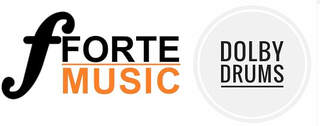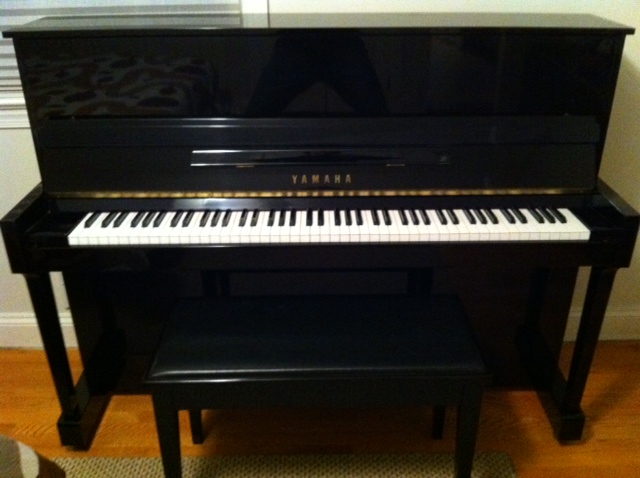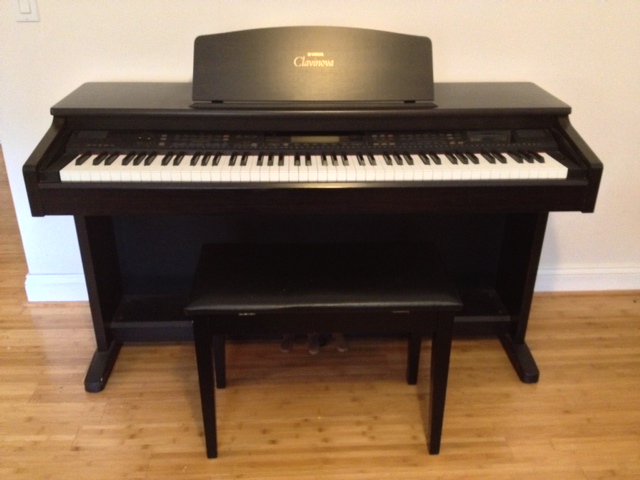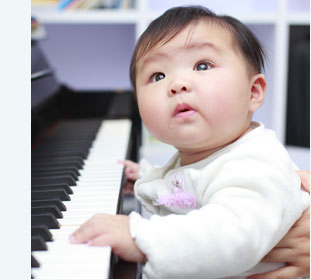|
Should you buy a Piano or Digital Piano? I will give you a high level overview of what to consider when making this decision. Usually people make this decision based on their budget, living arrangements, commitment/level of proficiency or some combination of all of these factors. This will be a three part blog focusing on each of these factors. This post will focus on the budget aspect.
Generally speaking, a digital piano is a less expensive option than an acoustic upright or grand piano, though you will often see free upright pianos being given away on craigslist. I would stay away from those unless you know what you are doing. They can easily be a bigger project than you might think when you consider moving expenses, tuning (can it even hold a pitch), brand, quality, etc. There are many digital pianos, however, that are more expensive than an acoustic piano, but for the purposes of this blog, I will use basic uprights and basic fully weighted 88-key digitals as the benchmarks. Whichever you end up buying, I would suggest that you stick to a well known brand so that if you do need to sell in the future, your piano will experience less depreciation. If acoustic, Yamaha and Kawai hold their value the best. Yes you will spend more, but 30 years from now, people will still want that piano. Lesser known brands will be give-a-ways at that age. Always buy a black piano. Brown ones do not hold their value like black ones do. The majority of people shopping are looking for a black piano because it goes with everything. If you are buying a digital piano, again, I would stick with the best brands. Yamaha Clavinova or YDP series, Roland, Kawai, and believe it or not, Casio has come up with a fantastic digital piano line with the Privia. There are so many brands like Williams, Suzuki and others that will fall apart quickly. Color is less important with digital pianos, but typically dark brown or black are the most desired. If buying a used digital piano for sale, test the keys and make sure they all have an even consistent sound and feel. Listen for “press and release” noise. This should be very quiet so it is not distracting to the player. Make sure the pedals work. Turn it off and on again to make sure the electronics are working properly. Age is important, but anything post 1998 should be adequate because by then, almost all electronic pianos made the change from analog sounds to sampled grand piano sounds, and there has been somewhat of a plateau since then. Renting a digital piano for a beginner is not a bad idea to save money if the player loses interest, or if they have a high level of interest, you may want to purchase an acoustic piano or more advanced digital piano. Piano rental allows you to defer that decision to a later date. If buying a used acoustic piano, check the age by serial number if you can find a source. Yamaha and Kawai post their serial numbers online so you can tell the age. Don’t be afraid of age if the piano is well maintained or rebuilt, particularly if it is a Yamaha or Kawai. Watch for “grey market” pianos. While there is nothing specifically wrong with these pianos, they were not built for the American market, so may have less value when you go to sell. Do not take on a free piano project unless you know what you are doing. I am happy to answer specific questions about models and prices. Just contact us at [email protected] Singing Strings rents and leases pianos and digital pianos to Northern Virginia, Washington DC, and Maryland, including Baltimore.
3 Comments
We are often asked, "How do we get our kids to practice their instruments more often?" Here are some suggestions to help increase their interest and keep them motivated:
1. Take your kids to concerts and performances We believe that the more you expose your kids to live music, and the more they get a chance to listen to good performers, the more they become interested and motivated to practice. 2. Have them listen to music listening to music helps your child gain a much better ear for music, and they become more responsive to sounds. Active listening also helps them with intonation if they play a stringed instrument. 3. Subscribe to music related magazines Reading and staying up to date on events in the music world will deepen their interest and commitment to their instrument. Sometimes a small investment like this will pay off long term. 4. Get to know your child's teacher We believe that the parent-teacher relationship is extremely important in understanding the progress of your child's musical education. Remember that it is going to be a team effort, and since they likely only meet the teacher once per week, it is important that they practice what they've learned the rest of the days 5. Enroll them in recitals. Enrolling your child in recitals gives them something to work toward, and keeps them motivated to practice since they will be performing in front of an audience. Please feel free to contact us if you have questions about this or other topics Parents are often eager to introduce their children to music early on because of all of the benefits that learning an instrument offers, but how young is too young to start? You probably guessed the answer: It depends on the child. Generally, we don't recommend starting one-on-one lessons before the age of five but we do see value in group lessons for children as young as two years old with the participation of the parent. During these group lessons, there is typically dancing, singing, learning about various instruments. Clapping and counting is also introduced as a way of exposing children to rhythm and time. These classes will also help keep the child interested in music because they are fun and engaging.
As the child approaches the age of five, it will be time to select an instrument and begin one-on-one lessons which we will discuss in an upcoming blog post. If you have questions about group lessons in or near Gaithersburg, MD, please feel free to reach out to us. |
About UsSinging Strings Music Center is located in Archives
January 2013
Categories
All
|




 RSS Feed
RSS Feed